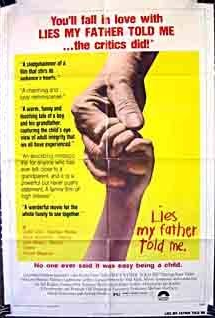
LIES MY FATHER TOLD ME
Canada, 1975, 102 minutes, Colour.
Yossi Yadin, Len Birman, Marilyn Lightstone, Jeffery Lyons, Ted Allan.
Directed by Jan Kadar.
Lies My Father Told Me: Jewish families are frequently on our screens. This pleasant saga of a Canadian- Jewish family early this century focuses on a very young boy and his loving admiration for his grandfather, a benign patriarchal rag and bone pedlar, filled with the warmth, wisdom and religion of tradition. Czech director Jan Kadar captures the detail of family life: the father a dreamer in business but sceptical about life, the mother trying to cope, the neighbours in the crowded old suburban tenements, and the point-of-view of the little boy who has to grow up and learn the difference between truth, lies and stories.
1. The significance of the title, its reference to the boy, to the father, grandfather? An indication of themes?
2. How attractive a film? Its appeal to audiences? The importance of the Canadian backgrounds, style, colour? The fact that the film was by a Czechoslovakian director?
3. How well did the film capture the early period of this century? The behaviour and attitudes of people? The style of life?
4. The Jewish focus of the film? How well illustrated was the Jewish background? The importance of the Jewish heritage, in Canada? Varying attitudes towards God and prayer? Jewish customs and ritual? The contrast with twentieth century scepticism, for instance in the father?
5. How well did the film focus on David? How much of the plot was seen through his eyes? Judgements on incidents and characters through his opinions? His happiness, his fear, his growing up?
6. How engaging a boy? For his age, his place in the family, the influence of family attitudes? His relationship with his neighbours? The importance of his grandfather and the ideals and companionship? His idolizing his grandfather? Which sequences illustrated this best? The importance of his relationship with Cleo? Their talk about life, e.g. sexuality? What were the lies that hurt him most, e.g. the question of breast-feeding? Religion and God?
7. The big events as seen by David? The importance of the cart and the horse, the baby, the visiting of the new house, the manure on the doorstep, the police, his grandfather's death?
8. How important was the ending and how convincing? In terms of psychological and emotional growth for the boy?
9. The importance and appeal of the grandfather? A good man, a good Jew, the nature of his work, his prayer? His comment on miracles? His concern for the boy and for his daughter? His attitude towards money and the father's dreams? His speeches on truth and lies? The discourse on flying through the air and autumn leaves? On birth, on breastfeeding, on the incident of the manure? The significance of his death and the way that this was visualized? His spirit still living for David?
10. The contrast with the mother and father? What kind of persons were they? Their relationship to each other, to the grandfather? The father's dreams and his moneymaking schemes and their failure? His irritability? His depending financially on the grandfather? His not relating well to his son and yet wanting to? What future did they have by the end of the film?
11. Comment on the picture of the neighbours, the interest in detail of character? Mr. Baumgarten and Lenin, Mrs. Tannenbaum and the manure, the girl who was the prostitute, the children in the household and the district, their prying on the neighbours etc.?
12. How much insight into the happiness and sadness of life? Themes of birth, growth, death? How much wisdom in a film of this kind?